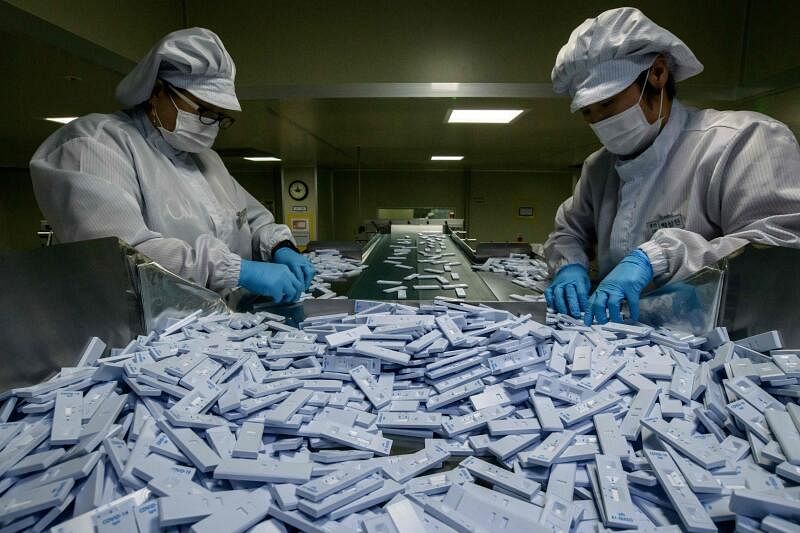COVID-19 SPECIAL
South Korea's early action to boost production of kits helped curb coronavirus spread
Sign up now: Get insights on Asia's fast-moving developments

SD Biosensor employees sort through coronavirus diagnostic kits in Cheongju, South Korea, on March 28, 2020.
PHOTO: AFP
Chang May Choon South Korea Correspondent In Seoul, Chang May Choon
Follow topic:
As soon as the genetic sequence of the coronavirus was revealed in mid-January, biotech firms in South Korea started developing diagnostic kits for the new virus.
On Feb 4, two weeks after the first case in South Korea emerged, the Ministry of Food and Drug Safety gave emergency approval for Kogene Biotech to manufacture the country's first Covid-19 test kit.
The 12-month approval process was cut to just one week, after painful lessons from the Middle East respiratory syndrome (Mers) outbreak in 2015 - which killed 38 of 186 infected people in South Korea - led to a change in the law to allow emergency approval during a crisis.
Another biotech firm, Seegene Inc, received approval on Feb 12. Together, the firms supplied thousands of diagnostic kits a day when South Korea embarked on mass testing from Feb 20 to contain the outbreak in the south-eastern city of Daegu.
By mid-March, three other biotech firms - Solgent, SD Biosensor and Biosewoom - were also manufacturing test kits.
South Korea's massive testing capability, which reached 20,000 a day, has been widely lauded for containing the virus and helped the country flatten the infection curve in just two months.
The number of new cases daily has remained below 20 for nearly two weeks - down from a peak of 909 on Feb 29 when South Korea was the second-most infected country after China. The total tally now stands at 10,761 cases - lower than Japan and Singapore.
The availability of test kits "played a major role in eliminating uncertainties in the early stages of the viral spread", according to a joint ministry paper published on April 15, which also credited the biotech firms' innovative use of technology and investment in research for the swift development of test kits.
By the time the World Health Organisation (WHO) urged countries to "test, test, test" in mid-March, South Korea had already tested more than 270,000 people. As of yesterday, the country of 50 million people has carried out 614,197 tests.
South Korea also exported US$131.9 million (S$186 million) worth of test kits in the first 20 days of this month, and the kits are now available in 106 countries, including the United States, according to the Korea Customs Service.
On April 20, Seegene announced it has exported more than 10 million test kits to over 60 countries and received approval to export to the US on April 22. The firm plans to increase its manufacturing capacity to over 20 million kits next month, and will "continue to scale up production to fulfil the unmet and increasing demand from all over the world".
Seegene's annual sales are expected to increase nearly 10 times to one trillion won (S$1.2 billion) this year. "We are proud to supply our diagnostic kits to the US," Seegene founder Chun Jong-yoon was quoted in Maeil Business newspaper.
The firm is now preparing an advanced product that can detect multiple mutants of the virus.

